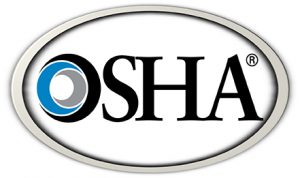The Occupational Safety and Health Administration (OSHA) requires many employers with ten or more employees to keep a record of serious work related injuries and illnesses (certain low risk industries are exempted). Employers must report any worker fatality within 8 hours and any amputation, loss of an eye, or hospitalization of any worker within 24 hours. Minor injuries requiring only first aid do not need to be recorded. This information helps employers, workers and OSHA evaluate the safety of a workplace, understand workplace hazards and prevent future workplace injuries and illnesses.
OSHA recently announced it is expanding its “Injury and Illness Record-keeping Rule” to encourage greater transparency of employer injury and illness data. Starting in 2017, the Rule will also require some employers to disclose occupational injury and illness information to OSHA electronically. Some of the electronically submitted data will then be posted to OSHA’s website. OSHA believes that this public disclosure of employer information will “nudge” employers to improve workplace safety and provide valuable information to workers, job seekers, customers, researchers and the general public. The amount of data submitted and publically posted will vary depending on the size of the company and the type of the industry.
The expanded Rule prohibits employers from “discouraging” workers from reporting an injury or illness. The final Rule requires employers to inform employees of their right to report work-related injuries and illnesses free from retaliation; implement procedures for reporting injuries and illnesses that are reasonable and do not deter workers from reporting; and incorporate the existing statutory prohibition on retaliating against workers for reporting injuries and illnesses. Originally slated to take effect August 10, 2016, OSHA is delaying enforcement of the anti-retaliation provisions in its new Injury and Illness Record-keeping Rule to provide education and outreach to employers. Enforcement of the anti-retaliation provisions of the Rule will now begin November 1, 2016 and the record-keeping rule takes effect on January 1, 2017.
You might feel confident that your workplace is already in compliance with the “anti-retaliation” provisions of OSHA’s Injury and Illness Recordkeeping Rule. You may even be asking yourself, “How is this a change in the law? Isn’t it already against the law to retaliate against an employee for reporting a workplace injury or illness?” While section 11(c) of the Occupational Safety and Health Act prohibits any person from discharging or discriminating against an employee for reporting an injury, illness or fatality, OSHA may not act under that section unless the employee files a complaint within 30 days of the retaliation. OSHA believes the new Rule is vital as it gives OSHA the “ability to protect workers who have been subject to retaliation, even when they cannot speak up for themselves”. Further, the issues under the expanded rule are more complicated than they first appear. You could be inadvertently violating provisions of the rule and unexpectedly land yourself in hot water with OSHA.
Here are some common workplace safety policies that could result in violations of OSHA’s new anti-retaliation provisions:
- Mandatory post-accident drug testing programs: The OSHA rule specifically recommends against “blanket post-injury” drug testing policies. However, OSHA also specifically indicates the rule does not prohibit post-injury drug testing of employees. It only prohibits employers from using drug testing, or the threat of drug testing, as a form of retaliation against employees who report injuries or illnesses. That being said, in connection with the rule, OSHA stated, “OSHA believes the evidence in the rulemaking record shows that blanket post-injury drug testing policies deter proper reporting.” Therefore, OSHA’s position on blanket post-injury drug testing appears to be equivocal and leaves employers without clear direction. OSHA’s recommendation against blanket post-injury drug testing may prove particularly problematic, given that Colorado’s Worker’s Compensation Act clearly contemplates post-accident drug and alcohol screening in light of C.R.S. sections 8-42-112, (“safety rule violation”), 8-42-112.5, (the “intoxication defense”), 8-42-103(1)(g) and 8-42-105(4)(a), (the “termination statutes”). For employers with “zero tolerance” policies, a positive post-accident drug or alcohol test could result in the termination of an injured employee’s employment, reducing their temporary indemnity benefits to zero. If the employer proves either an intoxication defense or safety rule violation, the injured employee’s indemnity benefits, temporary and permanent, would be reduced by 50 percent. While these concerns may not directly impact the course of worker’s compensation litigation, they could give rise to employment litigation outside the workers’ compensation system, particularly in light of OSHA’s independent ability to raise the retaliation issue under the expanded rule, without the need for the worker to file a complaint.
- Providing incentives exclusively to employees that have not been involved in workplace incidents or accidents: While OSHA indicates the rule does not prohibit incentive programs, it does state employers must not create incentive programs that deter or discourage an employee from reporting an injury or illness. For example, if you are trying to minimize injury by providing cash bonuses, paid time-off, employer-sponsored parties, or other compensation, for a certain number of “injury-free” days, or “no lost time”, you could be in violation of the rule. Unfortunately, OSHA’s alternative direction is vague at best. OSHA recommends incentive programs that “encourage safe work practices” and “promote safety-related activities”.
- If injured, off-work employees are excluded from workplace events, which could be considered a benefit of employment, such as luncheons, parties, football pools, birthday celebrations, or other work-related events or functions.
OSHA’s new Injury or Illness and Record-keeping Rule is complicated and could result in a quagmire of retaliation and perceived retaliation claims. Your current safety policy and procedures should be reviewed for compliance with the expanded rule. If you have questions about the rule, or whether your policies are in compliance, please contact us.






